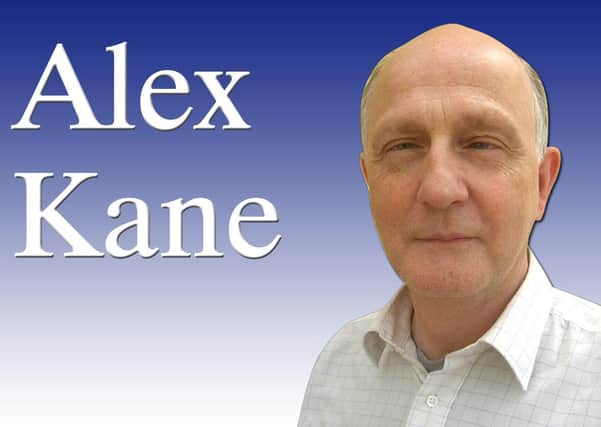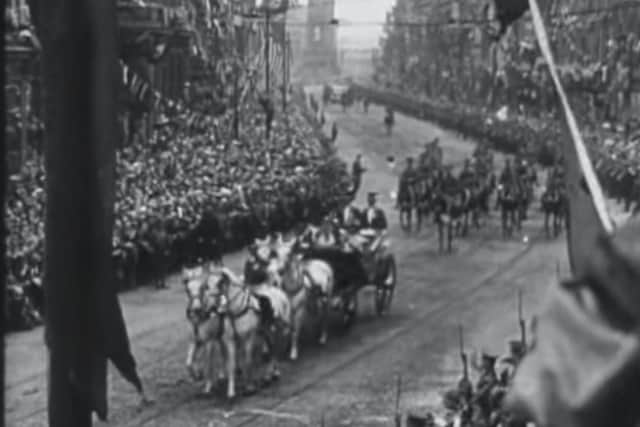Alex Kane: Unionism needs to work out what it means and stands for


On June 22, 1921, this is what George V said at the opening of the NI Parliament: “I inaugurate it with deep-felt hope, and I feel assured that you will do your utmost to make it an instrument of happiness and good government for all parts of the community which you represent. This is a great and critical occasion in the history of the Six Counties, but not for the Six Counties alone, for everything which interests them touches Ireland ...
“Few things are more earnestly desired throughout the English speaking world than a satisfactory solution of the age long Irish problems, which for generations embarrassed our forefathers, as they now weigh heavily upon us. I am confident that the important matters entrusted to the control and guidance of the Northern Parliament will be managed with wisdom and with moderation, with fairness and due regard to very faith and interest...”
Advertisement
Hide AdAdvertisement
Hide AdThe first time I read that speech – probably about 40 years ago – I was struck by the use of the term Six Counties (a description which nowadays angers most unionists).


It would have been used deliberately and after a great deal of consideration by Lloyd George’s government and may have been included – along with Northern Parliament – as a gesture of goodwill to those on the southern side of the new border who were still trying to establish political stability.
That parliament has, of course, gone. It’s very unlikely that the Queen will be invited to address the Assembly next year, not least because it doesn’t have a unionist majority. And I think it’s also unlikely that Boris Johnson will be invited to address any Union-celebrating events in Northern Ireland, if only because most unionists don’t trust him: and anyway, at this point we’ve no idea what he has up his sleeve in terms of sorting out his latest Brexit dilemma.
But that said, it is essential that unionists (and those who prefer the description pro-Union; which isn’t quite the same thing) do give very serious consideration to 2021. What are they celebrating? What is Ulster/Northern Ireland unionism and what is its relationship with English/Scottish/Welsh unionism?
Advertisement
Hide AdAdvertisement
Hide AdIs there such a thing as pan-UK unionism and, if so, what are the characteristics that underpin the accompanying identity. Is it true that a regenerated English nationalism (which, a slew of polls suggests, doesn’t seem to care about NI or Scotland) is a greater threat to the constitutional integrity of the UK than anything which the SNP or SF come up with?
If you are a unionist, how would you respond to any of those questions? What do you think unionism needs to do to both secure its existing vote and build a new one?
Do you trust any British government to prioritise the constitutional integrity of the UK in its present form? Do you think unionism in Northern Ireland can produce a coherent, attractive message for a modern audience, or does it need to return to a time when unity rather than diversity/division was its hallmark? Do you think the two main unionist parties have any specific influence at Westminster?
The reason I’m asking the questions is that I’ve spent a lot of my lockdown time in private dialogue with a number of people from a unionist/pro-Union background and I have been astonished by the range of answers to those and other questions. Yes, there is overall support for the UK (even among those who supported Remain rather than Leave), but when it came to what unionism means and how they define their identity and values there are very significant differences between them.
Advertisement
Hide AdAdvertisement
Hide AdBut three themes came through loud and clear: a desire for a coherent message, a greater willingness for political unionism (the parties) to work more constructively together and the ability to deconstruct the arguments for Irish unity rather than just brushing them aside.
Interestingly, the handful of people I’ve been talking to in England and Scotland also wanted to know more about what, precisely, Ulster/NI unionism was; particularly the differences between the shades, nuances, parties and fringe groups. Another, albeit smaller strand of opinion, suggested that a coherent message wasn’t possible with so many ‘unionist, loyalist, pro-Union, loyal order, civic unionist and so one’ voices competing for attention.
Regular readers of this column – which I think is just heading into its 20th year – will be aware that I’ve long stressed the need for unionism (in whatever form it manifests itself) to ask very difficult questions of itself and war-game for any possibility, irrespective of how unlikely it may seem at the time. I had hoped something would come of Peter Robinson’s Council for the Union proposal in 2012 (the centenary of the Ulster Covenant) and the DUP’s plans a couple of years ago about celebrating 2021 – but I’m not sure anything really happened with either.
Unionism cannot allow the still necessary debate to be lost in the concerns over Covid-19 and the departure from the EU. That there is still something clearly recognisable as ‘Ulster’ unionism is hugely significant more than a century after the Ulster Unionist Council was formed in 1905.
Advertisement
Hide AdAdvertisement
Hide AdThat there is still a pro-Union majority in NI (which I’m pretty sure there is) is also remarkable. But significant and remarkable won’t amount to a hill of beans if not shored up by addressing new realities and adapting to new political/electoral circumstances.
Let me end with one suggestion. It’s about time key voices across and within the unionist/pro-Union community were brought together to discuss many of the questions I have set out today. In my experience they are capable of civil and constructive engagement.
It doesn’t need a huge conference, either, at this point; just 25-30 people capable of isolating the key questions and establishing the machinery for addressing and answering them.
——— ———
A message from the Editor:
Thank you for reading this story on our website. While I have your attention, I also have an important request to make of you.
Advertisement
Hide AdAdvertisement
Hide AdWith the coronavirus lockdown having a major impact on many of our advertisers — and consequently the revenue we receive — we are more reliant than ever on you taking out a digital subscription.
Subscribe to newsletter.co.uk and enjoy unlimited access to the best Northern Ireland and UK news and information online and on our app. With a digital subscription, you can read more than 5 articles, see fewer ads, enjoy faster load times, and get access to exclusive newsletters and content. Visit https://www.newsletter.co.uk/subscriptions now to sign up.
Our journalism costs money and we rely on advertising, print and digital revenues to help to support them. By supporting us, we are able to support you in providing trusted, fact-checked content for this website.
Alistair Bushe
Editor